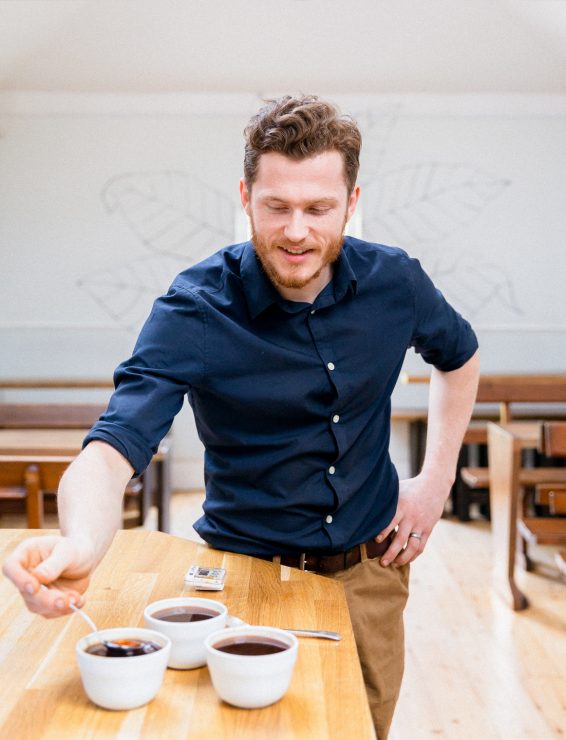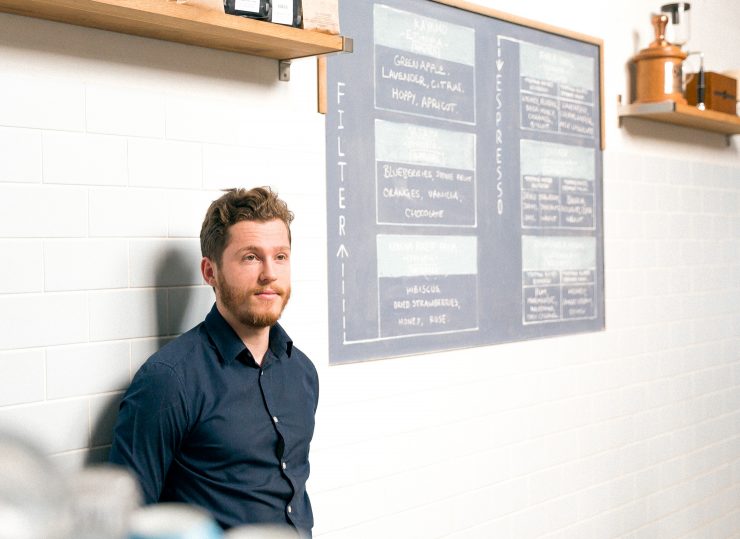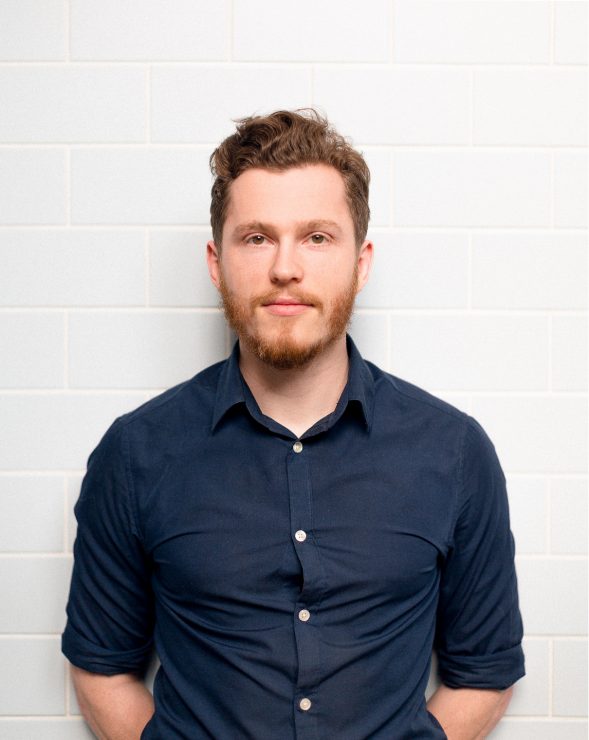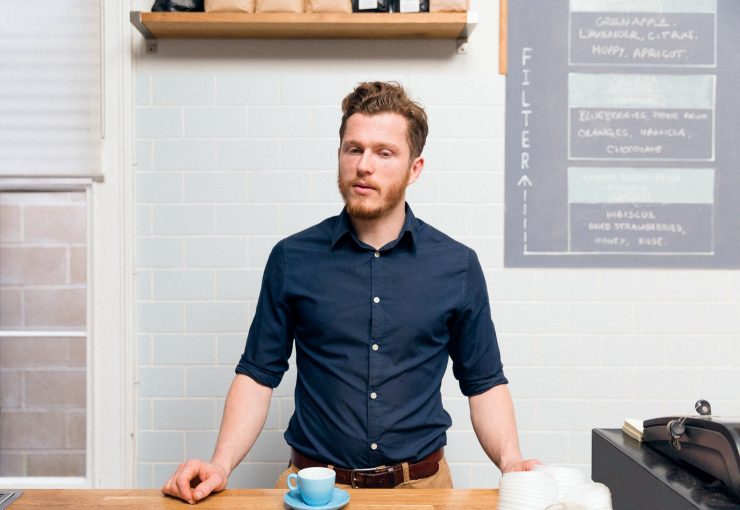One hesitates to discuss the advancement of British coffee culture today without mention of Maxwell Colonna-Dashwood. The current UK Barista Champion and three-time world finalist is the proprietor of Colonna & Smalls, a Bath-based business internationally renowned for the quality of its coffee. The recent addition of Colonna & Hunter, opened with Colonna & Smalls regular James Hunter, pairs specialty coffee and craft beer with popular results. Colonna-Dashwood has co-authored two academic research papers, one with computational chemist Chris Hendon—which has led to the two writing the highly-anticipated new book “Water for Coffee“—and an upcoming paper “How Latte Art Effects Taste Perception”, written with input from the world of sensory science.
Competitor, proprietor, author, and soon, roaster. Today in a world exclusive, Sprudge sat down with Maxwell Colonna-Dashwood to discuss his latest venture, a new coffee roasting brand named simply “Colonna”. Focusing on “coffees that are scoring really highly or are extremely rare,” his goal is nothing short of an unwavering commitment to quality without compromise to a global audience. You’ll want to keep reading.
Hello Maxwell, and congratulations on your recent barista competition success. Competition has obviously played a huge role in your career, so I’d like to start by asking, will you be going back next year?
Thank you. I’m really interested in competition and have been from the beginning. Not just winning—although that’s great—but beyond that how the system works, what needs to improve about it and how competition interacts with the rest of the industry. This was my last year of competing for awhile because I’ve agreed to go on the development board, so that frees up a lot of time.
Talk to us about your new roasting project. For many years Colonna & Smalls has been a multi-roaster; why the change?
By being a multi-roaster there was no inherent incentive to roast ourselves because we’re buying what coffee we think is exciting. We’ve really had an amazing relationship with roasters over the years. As we learn more—and we keep learning—we taste the roast process more than ever before, and it’s something I’m intrigued by. When you get into coffee as a barista, if there’s something that you’re not sure about in the coffee you blame yourself, you’re like “Oh… how can I make this taste better?”—you think you’re not brewing it right. There’s working through the range of extraction, brewing it well, checking the water, etc. You reach a point when actually you either just really like the coffee or you don’t, or maybe you don’t like the roast. Sometimes it might not even be a defective roast issue, it’s just an aesthetic difference, and so it’s kind of hard not to become interested in roasting.
It seems quite natural.
I think so, it’s a huge part of the process.

What direction do you think the roastery will take?
Every business we open we look at something we feel could be explored in a way that we feel is valuable and adds something to the industry and that we are excited by, so with roasting I had a few thoughts in mind. You’re tasting coffees that are scoring really highly or are extremely rare, and they’re interesting and exciting. I want to taste more of those coffees, I want to get more people aware that they exist. The people I train often want to buy interesting coffees and 250 grams is too much—you wind up with six open bags in their cupboard—so we are looking to ship in smaller amounts. By being more specialist, you inherently appeal to less people, so if we want to buy these coffees, we will have to appeal to a global audience. We’re put in the perfect position to do that because of our global reputation and the connections we’ve made over the years.
For equipment, we have a Diedrich 5-kilogram roaster and we’re getting this South Korean infrared roaster called the Stronghold, although I’m sure we’ll explore more. It’s the beginning so we are starting with getting hold of the coffee we want, developing the branding, and developing our own approach to roasting in a way we’re happy with. Obviously, I’ve got all sorts of problems in my head, I’m like “Global!?”
I was going to ask, your work with Chris Hendon is primarily focused on locality and roasting to the water of the area you are in. How are you intending to square that with global shipping?
It’s a good question. It’s one I’ve thought about and it’s being heavily considered in what we do. Brita, for example, make different home water filters for Europe and for Asia. The water is so systematically different with the two continents, they’ve said, “In Asia, we’re going to go with this amount of this resin, and in Europe—.” Maybe that could be an option—we could ship to Asia with slightly different roast profiles. Or maybe we could cup our coffee to the point where we’re happy with it with a range of waters. We want to buy really good coffee and we want to sell it the best possible way, we’re in a position where we can experiment.
So as a premium product, how are you looking at branding and packaging the coffees?
So the roastery will be called “Colonna”. Packaging wise… I read a blog once, it was a guy who used to work for Nestle. He was getting angry because people would buy expensive coffee, roasted fresh, and then stick it in a non-sealed bag. There are companies like Illy who have been exploring the best way to store coffee for a long time and there’s been some interesting studies. When you flush with nitrogen, for the first couple of weeks it actually doesn’t taste very good but then you improve shelf life up to six or seven months. That packaging (nitrogen-flushed tins) does two things: it changes the perception of the coffee because it’s not just a brown bag, and then it also increases the shelf life, which means the distribution network can improve.
When can we expect to taste some of your coffee?
Well you know, we’ve got Colonna & Smalls, Colonna & Hunter is doing well, and so the roastery can trundle along as a developmental project for say, six months, without any problems. When starting a more typical roastery model, there can be a lot of investments that result in pressure to secure wholesale accounts and hit certain numbers. We don’t have any of those obligations, so we can develop it to the point where we’re happy with it and then turn it into something commercially viable.
And “Water For Coffee” is now available for pre-order. Looking forward to that.
I’m excited! We’ve been so excited to get this book out and it’s kind of surreal to see it published. We are thrilled at the response and hope it can be something people can take benefit from, something to help the dialogue.
Sam MacCuaig (@sammaccuaig) is a UK based coffee professional. Read more Sam MacCuaig on Sprudge.
Photography by Ash James for Sprudge.com.
The post England’s Most Decorated Coffee Champion Is Now Roasting appeared first on Sprudge.




